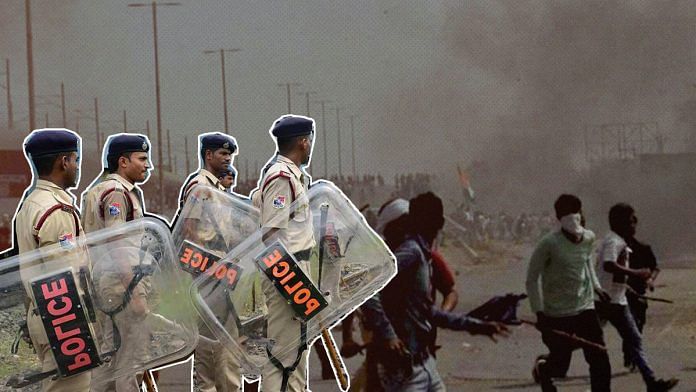Migrant workers, mostly from UP and Bihar, are reportedly fleeing Gujarat after 15 of them were attacked in the backlash against the rape of a 14-month-old girl in the state.
ThePrint asks– Migrants attacked in Gujarat: Mumbai-like anger for workers or reaction to minor’s rape?
Timing of incident is suspicious with 2019 elections around the corner
 Manoj Tiwari
Manoj Tiwari
MP and leader, BJP
This is a conspiracy by the Congress party. Prime Minister Modi, who won from Gujarat, has ensured complete unity in the state. The Congress party’s Alpesh Thakor is creating this ruckus in the state with the 2019 elections coming closer. The timing of this incident thus becomes suspicious. I go to Gujarat every now and then, and so I can say for a fact that all non-Gujaratis are safe in that land. The news of people fleeing the state is nothing but a result of rumour mongering perpetuated by Thakor. No one’s going anywhere, everyone is safe and secure in the state.
The entire Congress family are replete with thieves and criminals. The fact that they are linking a rape with certain communities, is condemnable. One look at the NCRB data will tell us that rapes happen in all communities and states. Gujarat is for everyone—Biharis and Maharashtrians alike. Alpesh Thakor’s importance is negligible in the state. His status is worse than that of a gali ka neta. But the people of Gujarat will teach them a lesson in the upcoming elections.
Gujarat does not have an anti-migrant history like Maharashtra
 Rita Kothari
Rita Kothari
Author and professor, Ashoka University
As someone who has lived as a Sindhi in Gujarat all my life, I can say that non-native Gujaratis have often felt a sense of belonging in Gujarat. Of course, this is the experience of those with the privilege of living in a developed city like Vadodara with basic amenities intact. Textile mills were very prominent in Gujarat back in the 1970s and 1980s and would attract labourers from many states. So, by and large, Gujrat inspires a feeling amongst migrants that it is a good state to reside in. Historical archives tell us that Gujarat has had no such anti-migrant history, something highly prominent in a state like Maharashtra. It is true that the Gujarati upper caste can be intolerant towards non-vegetarians but the vocabulary of designating people ‘outsiders’ is missing in the state.
In that sense, this migrant attack that we are witnessing is quite unprecedented. I take strong objection to Alpesh Thakor and the language of hate he is perpetuating. Once the juggernaut starts rolling, it will be very difficult to reverse it. Using the issue of the rape of a minor as an excuse for their anti-migrant rhetoric is uncalled for. Women get raped by men from across communities and states—by ‘insiders’ as well as ‘outsiders’. Rape is being used as a divisive tool to speak a language that isn’t the language of Gujarat.
People envious of Alpesh Thakor bhai’s rise are trying to tarnish his name
 Thakor Bhikabhai
Thakor Bhikabhai
Senior member and in-charge, Kshatriya Thakor Sena
Media carried the news of members of Kshatriya Thakor Sena perpetuating anti-migrant violence, but that is completely false. Migrants have been residing in Gujarat for decades now, and we have no problem with them. Someone else is behind this violence, not us. In fact, we have even issued a helpline number for the migrants who are being persecuted. Through ThePrint, I would like to tell those from the migrant community who are fearful, please reach out to us. We would extend all support to them.
As far as the rape of the minor is considered, it is a shameful matter. The men behind this rape need to be punished. It upsets us that such little action has been taken against them. We can’t do much besides following Gandhi ji’s path and asking for justice in a non-violent manner. But the Kshatriya Thakor Sena won’t ever commit any act of violence against the entire migrant community. Those people are here to earn an honest livelihood, why would we have anything against them? Some miscreants who are envious of Alpesh Thakor bhai’s rise and influence are trying to tarnish his name.
Also read: It is ‘illegal migrants’ vs students’ unions in Northeast India
Real issue is the dangerous levels of rage in each Indian that manifests this way so easily
 Mallika Sarabhai
Mallika SarabhaiClassical dancer and social activist
We are a very volatile, anger, fear and hate-filled society, where most mob crimes go unpunished. We also live in times when the dominant voices are dividing us, by race, religion, gender, caste and community. Hate crimes of one group against the another go largely unpunished. Every day we are filled with fright-mongering tales of the ‘other’ – they will take your women, cows, jobs, homes, and aspirations. Anything can become a flashpoint for outrage with impunity. All we need is a spark, and an allegation. Yes, there is outrage that the child was 14-months old, but this is not the first case of such horror here or anywhere. All it needed was the added information that a Bihari man was allegedly involved. Suddenly there is a group you can blame, beat up, the ‘other’ is manifest and all violence is okay. Suddenly all differences within, in this case the Thakors, are forgotten. A brotherhood of outrage and indignation acts as a glue. Anger and frustration at life, at our times, at all the injustices and indignities meted out to us every day – the rude badgering policeman, the scooterist who bumped you, the pan spit that just missed you, the petty officer you had to eat humble pie with, the jeering upper caste bully – result in an uncontrolled violent rage that leads you to pummel people to pulp. And the moral outrage allows us to feel vindicated, upright, righteous.
 Urvish Kothari
Urvish Kothari
Senior columnist and writer
In a state where the PM will unveil the Statue of Unity at the end of this month, an exodus of non-Gujarati workers is taking place as a sad reminder of the lack of unity. The mass re-migration has been triggered by various attacks on non-Gujarati migrants across Gujarat. The apparent cause reported for such attacks? An incident of rape by a non-Gujarati worker.
It is ironic that such anti-outsider attacks are happening in Gujarat, a state that has a long seen its citizen migrating to foreign lands. Fingers are being pointed especially at Thakor Sena, an OBC outfit led by Alpesh Thakor, for such attacks. Thakor himself, an MLA with Congress, is believed to be in the process of migrating to the BJP. But the present unrest has more to do with economic reasons (as it happened during the communal riots, at least in some areas): Non-Gujaratis are viewed as people who come here and make money (of course by hard work, but that’s not considered). Some of the local population, unable to compete with non-Gujarati workers in the matter of hard work tend to envy and hate the outsiders, instead of giving them stiff competition.
The state government failed to read the early signs and was completely caught unaware. The police force, with a fair proportion of non-Gujarati officers, is fairly trying to do the difficult job of giving protection to the scattered non-Gujarati population. Yet, unity among fellow Indians seems to be a tall order, even taller than the tallest statue of the world.
Alarming apprehensions about widespread & violent backlash far-fetched
 Amit Dholakia
Amit Dholakia
Professor of Political Science, Maharaja Sayajirao University, Vadodara
The alarming apprehensions about a widespread and violent backlash against migrants from Bihar, Uttar Pradesh and Madhya Pradesh working in Gujarat seem misplaced and far-fetched.
The few sporadic reactions, so far, have been highly localised in the areas close to the place where a 14-month-old girl was allegedly raped by a migrant worker from Bihar. These reactions do not indicate a clear pattern of socio-political mobilisation against non-Gujarati population in the state.
Anger against so-called ‘outsiders’ has never been a part of the political culture, social psychology or moral disposition of average Gujaratis. In fact, prominent Gujarati poets like Narmad and Umashankar Joshi defined ‘Gujarati identity’ essentially in cosmopolitan terms, based on its capacity to engage with the culture and ways of life that non-Gujaratis bring to the state.
The ‘other’ in Gujarat has almost always been defined in terms of religious or caste identity. Indeed, the relentless ideological focus on ‘Hindu-Muslim’ social divide by the ‘Sangh Parivar’ outfits in Gujarat has not allowed space for cultivation of an exclusive and monolithic Gujarati identity.
Gujaratis themselves have been among the earliest migrants, travelling to different parts of India and abroad for trade and business. Therefore, there is an overall acceptance of the requirement of employing migrant labour for rapid economic growth and development.
Migrant labourers from Rajasthan, Uttar Pradesh, Bihar and Odisha have been prominent contributor to the growth of textile, diamond, engineering and chemical industries in the state. They have also been prominent players in the construction and real estate business.
Most of the provision stores in Gujarat are owned by people who have migrated from Rajasthan. Of late, higher agricultural growth in Gujarat has led to people from other states working here as agricultural labour.
The present reactions against North Indian migrants will soon be contained through administrative actions. No political party or prominent group in Gujarat will like to been seen as encouraging the ‘insider-outsider’ divide in the state.
By Fatima Khan, journalist at ThePrint. You can follow her on twitter @khanthefatima.




The Biharie n the people from m.p n u.p r contributing largly to the economic development of the state n without which the real estate or the infrastructure wouldn’t have been so wide.So in reality,they can’t be dispensed with ,as the outsiders a
are the real backbone n boon in disguise.Ours is a democratic country n every citizen has a right to live n let live.The hoogligans should leave their petty tactics ,just to win elections.
Internal migration for work – it could be seasonal, for harvest of crops or longer term, as in industry or services – is one of the factors that is binding India more tightly together. We are a large, subcontinental economy. When young people from the north easy find well paying jobs in Bangalore, that does more to bring this distant region closer to the mainland than other government initiatives could. 2. The trigger in this case was a very painful act. However, to convert that into a violent reaction against people from UP and Bihar, forcing thousands of them to flee, should worry both the state and the union government. Bonds forged over decades are being severed. It may have something to do with heightened animosities towards people who are not like us, however defined. We should heed these warning shots in good time.